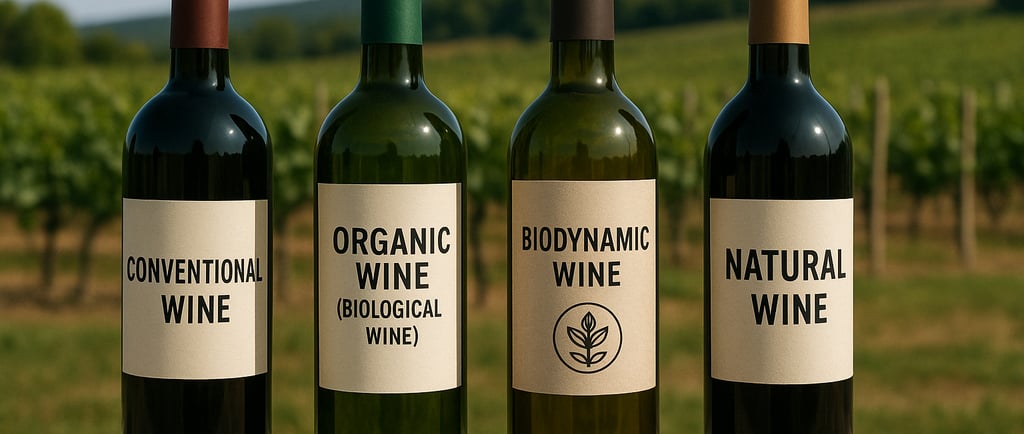International Delivery! 📦
Decoding Wine Labels: Conventional, Organic, Biodynamic and Natural Wines
Unlock the mysteries behind wine labels! Discover the key differences between conventional, organic, biodynamic, and natural wines to make informed choices for your palate and values.
5/29/20252 min read


🍷 Introduction
Standing in the wine aisle, eyes darting across labels that boast terms like "natural," "organic," "biodynamic," and "conventional," can leave anyone bewildered. While these categories may seem interchangeable, they reflect vastly different philosophies and practices in winemaking. Understanding these terms helps you choose wines that align with your health preferences, environmental values, and taste desires. Let’s uncork the truth.
🍇 What Is Conventional Wine?
Key Characteristics
Conventional wine is the most commonly produced type, made with modern agricultural practices. It often involves synthetic fertilizers, herbicides, pesticides, and fungicides in the vineyard. During fermentation, winemakers may use commercial yeasts, enzymes, acids, tannins, and even color enhancers to create a consistent product.
Pros and Cons
Pros: Predictable flavor profiles, longer shelf life, widely available.
Cons: Potential pesticide residue, higher sulfite content, reduced expression of terroir.
🌱 What Is Organic Wine (Biological Wine)?
Defining “Biological” in Wine
"Biological wine" is another term for organic wine, more commonly used in Europe. These wines come from grapes grown without synthetic chemicals, focusing on natural soil fertility and pest control.
Organic Certification Requirements
No synthetic pesticides or herbicides
Sulfites limited or prohibited (depending on certification)
Certified by bodies like USDA Organic or EU Organic
Flavor Profile and Benefits
Organic wines often exhibit a purer expression of the grape and terroir, making them appealing to eco-conscious and health-aware drinkers.
🌍 What Is Biodynamic Wine?
The Philosophy of Biodynamic Farming
Biodynamic wine takes organic practices a step further. Inspired by Rudolf Steiner’s early 20th-century teachings, biodynamic farming treats the vineyard as a living ecosystem. It incorporates lunar cycles, cosmic rhythms, and homeopathic soil preparations.
Certification and Practices
Certified by Demeter or Biodyvin
Uses compost teas, horn manure, and flower preparations
Emphasizes biodiversity, composting, and animal integration
Unique Selling Points
Biodynamic wines are known for their deep sense of place and often more complex, earthy profiles.


🍷 What Is Natural Wine?
A Minimalist Approach
Natural wine is made with minimal intervention. Grapes are often handpicked, fermented with wild yeasts, and bottled without filtering, fining, or added sulfites.
The Lack of Regulation
Natural wine lacks official certification. Its definition depends on community standards rather than legal frameworks, leading to variability in production and quality.
What to Expect in Taste and Texture
Expect vibrant, cloudy, and sometimes funky wines that offer a raw and lively taste. Natural wines can be unpredictable, varying from bottle to bottle.
🔍 Comparing the Four Wine Types
🛒 How to Choose the Right Wine for You
Health-Minded? Choose organic or natural
Eco-Friendly? Go biodynamic
Flavor Consistency? Opt for conventional
Adventure Seeker? Try natural wines
💡 Tips for Reading Wine Labels Like a Pro
Look for certifications: USDA Organic, EU Organic, Demeter
Read producer notes for terms like “no added sulfites” or “wild yeast”
Investigate vintage and region to understand the wine’s backstory
🧠 Conclusion
Decoding wine labels isn’t just about semantics—it’s about knowing what goes into your glass. Whether you're drawn to the purity of organic wine, the cosmic philosophy of biodynamic, the raw vibrancy of natural, or the reliable taste of conventional, the key is informed choice. Cheers to sipping smarter!
🍷 Find your perfect bottle in our vintage wine shop!
👉 Visit Now


